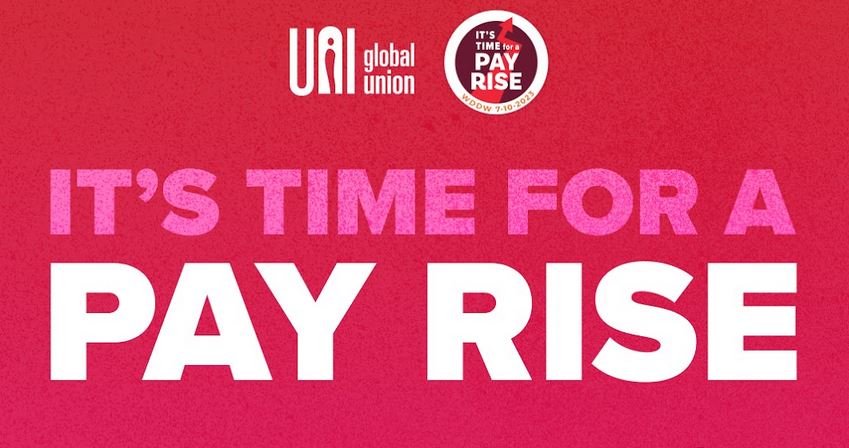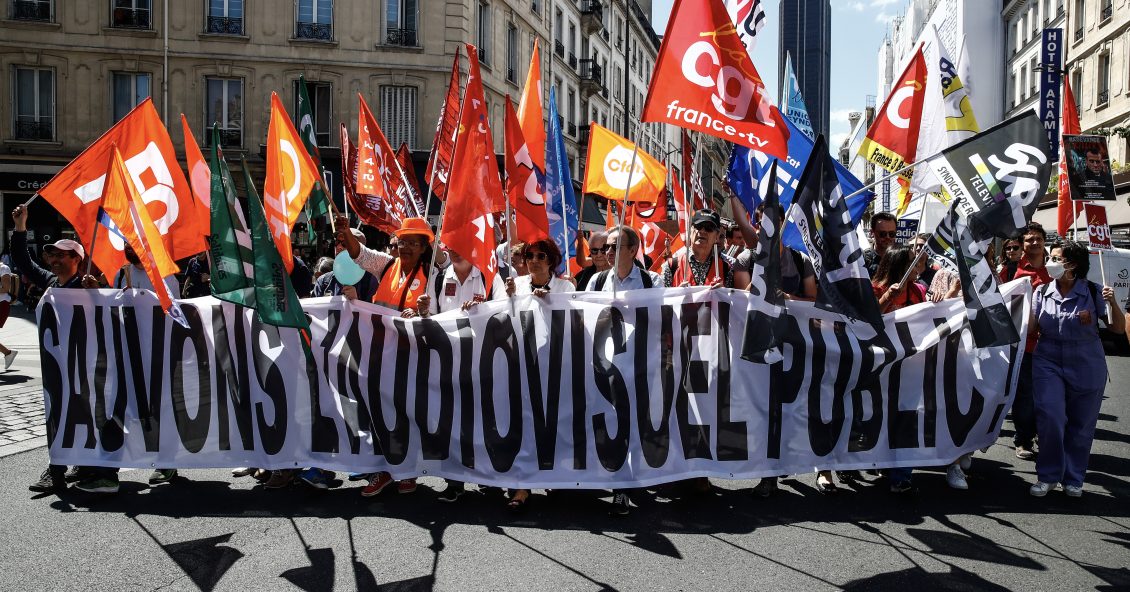#WDDW23: It’s time for a pay rise
06.10.23
This 7 October, unions around the world are sharing an urgent message on the World Day for Decent Work: It’s time for a pay rise!
Corporate profiteering has spurred inflation across the globe, putting essentials like food and shelter out of reach for too many workers. Meanwhile, the rich have never been better off.
Since the start of the Covid-19 pandemic, Oxfam reports that the wealthiest 1 per cent of the population accumulated nearly double the wealth of the bottom 99 per cent combined. These disproportionate gains worsen a forty-year trend of workers receiving a shrinking portion of economic pie.
UNI Global Union General Secretary Christy Hoffman said:

“Executives and shareholders cannot continue to hoard record profits while giving crumbs to the people who made them successful. This breeds shocking inequality, undermines our democracies and traps millions of families in poverty.
“The only way to transform our broken global economy into a just one is building union power. Unions are at the core of decent work, and we are necessary to shift power to the many from the few. This year, we are seeing an unprecedented number of workers rising together to demand the wages and conditions they deserve. UNI stands in solidarity with them.”
Rising Together for a wage with dignity
Unions are fighting back. Union members earn between 10 to 25 per cent more than workers not covered by collective bargaining, and the gender pay. There are hundreds – even thousands – of examples of workers collectively winning wages with dignity through organizing, strikes and collective bargaining.
Since the last World Day for Decent Work, UNI affiliate FATSA won an inflation-busting pay rise of nearly 100 per cent for 35,000 care workers in Argentina.
Japanese unions won higher-than predicted pay rises during their annual wage negotiations known as the “shunto,” or spring offensive. In New Zealand, E tū, have won a Fair Pay Agreement this year that paves the way for improved wages and working for security guards nationwide. More than 60,000 care workers care workers in South Korea went on strike for better wages and staffing.
More than 200,000 commerce workers gained a well-deserved pay increase in Finland through a new sectoral agreement. Montenegro Telekom workers won a 136-day strike that resulted in their first real raise in years. Austrian affiliate GPA negotiated a sectoral agreement for 65,000 IT workers that shrinks the gender pay gap and boosts salaries by 17 per cent for the lowest-paid workers.
Carrefour workers in Uganda reached their first ever collective agreement, which improves pay and financial benefits for workers there.
These victories are just a small sample among a large number of union wins.
The fight continues
But far too many numbers of workers do not have the protections of collective bargaining, and there are many more examples of unions in active struggle to push for better pay.
In Germany, tens-of-thousands-of ver.di retail members have taken strike actions for ongoing negotiations in their sector. In the US, more than 130,000 property service workers represented by SEIU are campaigning for a collective agreement with big wage improvements
Amazon workers around the world are organizing for higher wages, union recognition and collective bargaining. From the Philippines to California, Fresenius workers are pushing for respect and compensation that reflects their dedication.
The Croatian Telecommunications Union is organizing a World Day for Decent Work protest against low wages at employer A1 Hrvatska, and in Italy, CGIL will hold a massive demonstration in Rome next week under the theme “On the road for a fair deal for workers, against the return to austerity policies.”
On why these wage fights are so crucial, ITUC Acting General Secretary Luc Triangle said: “Wages are central to the New Social Contract and are the basis for sustainable and equitable economies. Many employers are refusing to share prosperity with the workers who produce the goods and provide the services that generate wealth, and with corporate tax avoidance and evasion at record highs, the public sector is also starved of the resources it needs to ensure decent levels of pay.”
News
UNI Africa
UNI Americas
UNI Asia & Pacific
UNI Europa


